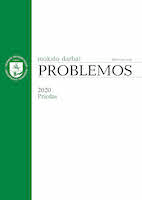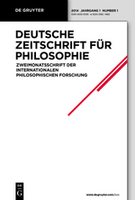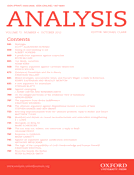
Problemos
Scope & Guideline
Pioneering New Frontiers in Philosophical Thought
Introduction
Aims and Scopes
- Interdisciplinary Philosophical Inquiry:
'Problemos' publishes works that draw on multiple philosophical traditions, facilitating dialogues between Western and Eastern philosophies, as well as contemporary and historical contexts. - Exploration of Fundamental Philosophical Themes:
The journal aims to delve deeply into core philosophical concepts such as existence, consciousness, ethics, and politics, examining their implications in contemporary society. - Focus on Phenomenology and Existentialism:
A consistent emphasis is placed on phenomenological and existentialist approaches, exploring how these frameworks can inform current philosophical debates and human experiences. - Political Philosophy and Social Theory:
'Problemos' regularly engages with political philosophy, examining issues of agency, identity, and justice, particularly in relation to modern sociopolitical contexts. - Philosophical Engagement with Science and Technology:
The journal addresses the intersection of philosophy with science and technology, particularly concerning ethical implications and the nature of consciousness in the age of AI.
Trending and Emerging
- Phenomenology and Psychopathology:
There is an increasing focus on the intersection of phenomenology and mental health, particularly in understanding psychosis and agency, highlighting the relevance of existential approaches to contemporary psychological discourse. - Political Philosophy and Biopolitics:
Emerging discussions on biopolitics and its implications for modern governance and social theory indicate a trend towards examining how political structures affect individual lives and collective identities. - Cultural and Existential Crisis:
A rising interest in exploring cultural crises through philosophical lenses reflects a societal preoccupation with identity, belonging, and the impact of modernity on human experiences. - Technological Ethics and AI:
The dialogue surrounding ethics in the context of artificial intelligence and technology is gaining traction, emphasizing the need for philosophical frameworks to navigate contemporary technological dilemmas. - Ecological and Environmental Philosophy:
An emerging theme in recent years is the philosophical exploration of ecological and environmental issues, representing a response to global crises and the need for sustainable practices and ethical considerations.
Declining or Waning
- Classical Metaphysics:
Discussions around traditional metaphysical themes have seen a decline, with fewer papers exploring classical metaphysical concepts in depth, possibly due to a shift towards more pragmatic and phenomenological approaches. - Historical Philosophical Figures:
There is a noticeable decrease in papers focused specifically on historical philosophical figures outside of their relevance to contemporary issues, indicating a preference for current philosophical discourse. - Analytic Philosophy:
The journal appears to be moving away from purely analytic philosophy discussions, as the trend leans more towards phenomenological and existential approaches, reflecting a broader interest in subjective experience. - Narrowly Defined Ethical Theories:
While ethical discussions remain important, there has been a reduction in the focus on narrowly defined ethical theories, with more emphasis on broader social and political implications of ethical considerations.
Similar Journals

DEUTSCHE ZEITSCHRIFT FUR PHILOSOPHIE
Cultivating a rich tradition of philosophical scholarship.DEUTSCHE ZEITSCHRIFT FUR PHILOSOPHIE is a prominent academic journal dedicated to advancing the field of philosophy, published by WALTER DE GRUYTER GMBH. Since its inception in 1953 and extending its converged years to 2024, it has been a pivotal platform for scholarly discourse, fostering critical thought and innovative ideas in philosophical studies. With its ISSN 0012-1045 and E-ISSN 2192-1482, the journal holds a commendable position in the academic community, recognized as a Q2 journal in the 2023 Philosophy category, currently ranked #390 out of 806 in the Scopus Arts and Humanities rankings, placing it in the 51st percentile. Although it does not offer open access, its commitment to rigorous peer review ensures that each publication meets high academic standards, making it an invaluable resource for researchers, professionals, and students seeking to engage with contemporary philosophical debates and theories. The journal is situated in Berlin, Germany, at Genthiner Straße 13, D-10785 Berlin, Germany, and continues to be an essential outlet for philosophical inquiry and scholarly achievement.

PHRONESIS-A JOURNAL FOR ANCIENT PHILOSOPHY
Deepening Understanding of Historical Philosophical TraditionsPHRONESIS: A Journal for Ancient Philosophy, published by BRILL, stands as a premier academic forum dedicated to the exploration of ancient philosophical thought. With its ISSN 0031-8868 and E-ISSN 1568-5284, this journal not only enriches the field of history and philosophy but has also earned a distinguished reputation, reflected in its Q1 ranking in both History and Philosophy categories for 2023. The journal serves a vital role in disseminating scholarly articles that contribute to a deeper understanding of ancient philosophical discourses, impacting both historical studies and contemporary philosophical perspectives. Although not open access, its extensive convergence of issues since its inception in 1957 ensures a wealth of research available through institutional access. With a focus on fostering interdisciplinary dialogue, PHRONESIS offers invaluable insights for researchers, professionals, and students committed to the rich legacy of ancient philosophy.

Revista de Filosofia UIS
Unlocking the depths of thought through rigorous research.Revista de Filosofia UIS is a prestigious academic journal published by UNIV INDUSTRIAL SANTANDER, dedicated to advancing the field of philosophy through rigorous research and scholarly discourse. With an ISSN of 1692-2484 and an E-ISSN of 2145-8529, this journal has maintained an open access policy since 2007, ensuring that high-quality philosophical insights are accessible worldwide. Based in Bucaramanga, Colombia, the journal aims to foster interdisciplinary dialogue on contemporary philosophical issues, making it an essential resource for researchers, professionals, and students alike. Although it is still in the process of establishing its HIndex and Scopus rankings, the Revista de Filosofia UIS continues to attract contributions from esteemed scholars, solidifying its role as a vital platform for philosophical inquiry and publication.

Journal of Japanese Philosophy
Illuminating the Richness of Japanese PhilosophyThe Journal of Japanese Philosophy, published by SUNY Press, serves as a pivotal platform for scholars and practitioners interested in the rich tapestry of Japanese philosophical thought. With its ISSN 2327-0195 and E-ISSN 2327-0209, this journal invites rigorous scrutiny and creative engagement with both traditional and contemporary philosophies emerging from Japan. While the journal does not currently offer Open Access options, it remains accessible through major academic libraries and databases. By fostering interdisciplinary dialogue, the Journal of Japanese Philosophy aims to illuminate various aspects such as aesthetics, ethics, politics, and environmental philosophy, contributing significantly to the broader field of philosophy. As a respected source of scholarship, it plays a critical role in shaping the understanding of Japanese philosophy within global contexts, making it an essential resource for researchers, professionals, and students alike.

Filosofia Unisinos
Bridging Theory and Practice in Philosophical ResearchFilosofia Unisinos, an esteemed journal in the field of Philosophy, is published by the Universidade do Vale do Rio dos Sinos (UNISINOS) in Brazil. Since its inception, the journal has embraced an Open Access approach, welcoming contributions from scholars globally. With its ISSN 1519-5023 and E-ISSN 1984-8234, it has positioned itself as a vital resource, showing consistent growth in academic circuit, reflected by its Q3 Quartile ranking in the 2023 Scopus category for Philosophy, indicating its relevance and contribution to the discipline. Covering a broad range of philosophical inquiries, from theoretical frameworks to contemporary interpretations, the journal offers a platform for rigorous scholarly dialogue and fosters innovative research. As it moves towards its convergence year in 2024, Filosofia Unisinos continues to be pivotal for researchers, professionals, and students interested in exploring the multifaceted landscape of philosophical thought.

Filosofskii Zhurnal
Exploring the Depths of Thought and CultureFilosofskii Zhurnal, published by the esteemed Russian Academy of Sciences - Institute of Philosophy, is a renowned academic journal focused on the vibrant fields of Philosophy, Cultural Studies, History and Philosophy of Science, and Linguistics. With an ISSN of 2072-0726 and an E-ISSN of 2658-4883, this esteemed publication has been a pivotal source of scholarly discourse since its inception in 2019, with converged years extending through 2024. Holding a distinguished Q2 quartile ranking in several disciplines, the journal is instrumental in advancing knowledge and research within its realms, making significant contributions to the understanding of philosophical thought, cultural dynamics, and language interpretation. Although it does not currently offer open access options, the journal maintains a strong presence in Scopus with notable rankings, including its position at #490/806 in Philosophy and #837/1304 in Cultural Studies. By providing a platform for original research, critical reviews, and interdisciplinary dialogue, Filosofskii Zhurnal serves as a valuable resource for researchers, professionals, and students seeking to deepen their understanding of philosophical inquiry and related fields.

ANALYSIS
Unraveling the Complexities of PhilosophyANALYSIS, an esteemed journal published by Oxford University Press, ranks in the top quartile (Q1) within the field of Philosophy, showcasing its significance in disseminating cutting-edge research and critical studies since its inception in 1933. With an ISSN of 0003-2638 and an E-ISSN of 1467-8284, the journal has maintained a dedicated readership across various converged publications from 1933 to the present. Based in the United Kingdom, ANALYSIS is committed to exploring foundational philosophical questions and advancing theoretical dialogue in both traditional and contemporary contexts. The journal is recognized for its rigorous peer-review process and is indexed in Scopus, reflecting its solid standing at rank #178/806 in the Arts and Humanities domain, encompassing the 77th percentile of its category. Although currently not available as an open-access journal, ANALYSIS provides invaluable insights and a platform for philosophical discourse that appeals to scholars, professionals, and students alike, fostering a deeper understanding of the complexities in the world of philosophy.

PHILOSOPHIA
Advancing Philosophical Inquiry Since 1971PHILOSOPHIA is an esteemed academic journal published by Springer, focusing on the diverse field of philosophy. With an ISSN of 0048-3893 and E-ISSN 1574-9274, this journal serves as a prestigious platform for innovative philosophical discourse and research. Based in the Netherlands at VAN GODEWIJCKSTRAAT 30, 3311 GZ DORDRECHT, PHILOSOPHIA has garnered a reputation for its high-quality contributions, maintaining a Q1 classification in Philosophy and ranking 229 out of 806 in the Scopus Arts and Humanities category, placing it within the top 71st percentile. The journal's scope spans critical analyses and contemporary debates, making it an essential resource for philosophers, scholars, and students seeking to engage with cutting-edge ideas. Although it does not currently offer open access, its rigorous review process and academic integrity ensure that published articles are of the highest scholarly standard. With its convergence of contributions since 1971 and ongoing commitment to advancing philosophical inquiry, PHILOSOPHIA remains pivotal in shaping both theoretical and practical understandings within the discipline.

FILOZOFIA
Bridging Cultures through Philosophical ExplorationFILOZOFIA is a prominent open-access journal published by the Institute of Philosophy of the Slovak Academy of Sciences and the Institute of Philosophy of the Czech Academy of Sciences. Since its inception in 2002, it has become a vital resource in the fields of Philosophy and Religious Studies, achieving a Q2 ranking in Philosophy and a Q1 ranking in Religious Studies as of 2023. With an ISSN of 0046-385X and an E-ISSN of 2585-7061, the journal delivers high-quality, peer-reviewed research accessible to a global audience following its transition to open access in 2020. Its commitment to scholarly excellence is reflected in its Scopus rankings, placing it in the top half of both fields with significant contributions to ongoing philosophical discourse. Researchers, professionals, and students alike benefit from the journal's dedication to fostering dialogues that challenge and expand the realms of philosophical inquiry and understanding.

Claridades-Revista de Filosofia
Exploring the Depths of Philosophical ThoughtClaridades-Revista de Filosofia is a distinguished open-access journal dedicated to the exploration of philosophical thought and discourse, published by the ASOC PROMOCION FILOSOFIA & CULTURA MALAGA-FICUM. Since its inception in 2009, the journal has been committed to providing a platform for innovative philosophical research and insights, fostering engagement within the academic community and beyond. Based in the culturally rich city of Malaga, Spain, the journal caters to the diverse landscape of philosophical inquiry, with a focus on nurturing academic exchange globally. Although the journal currently holds a Q4 ranking in Philosophy according to Scopus, it aims to elevate its impact and contribute significantly to contemporary philosophical debates. Researchers, professionals, and students alike will find a wealth of thought-provoking articles and discussions that not only enrich their understanding of the discipline but also encourage critical dialogue about the pressing philosophical issues of our time. With its dedicated mission and open access model, Claridades is poised to be an essential resource for anyone invested in the vibrant and evolving field of philosophy.